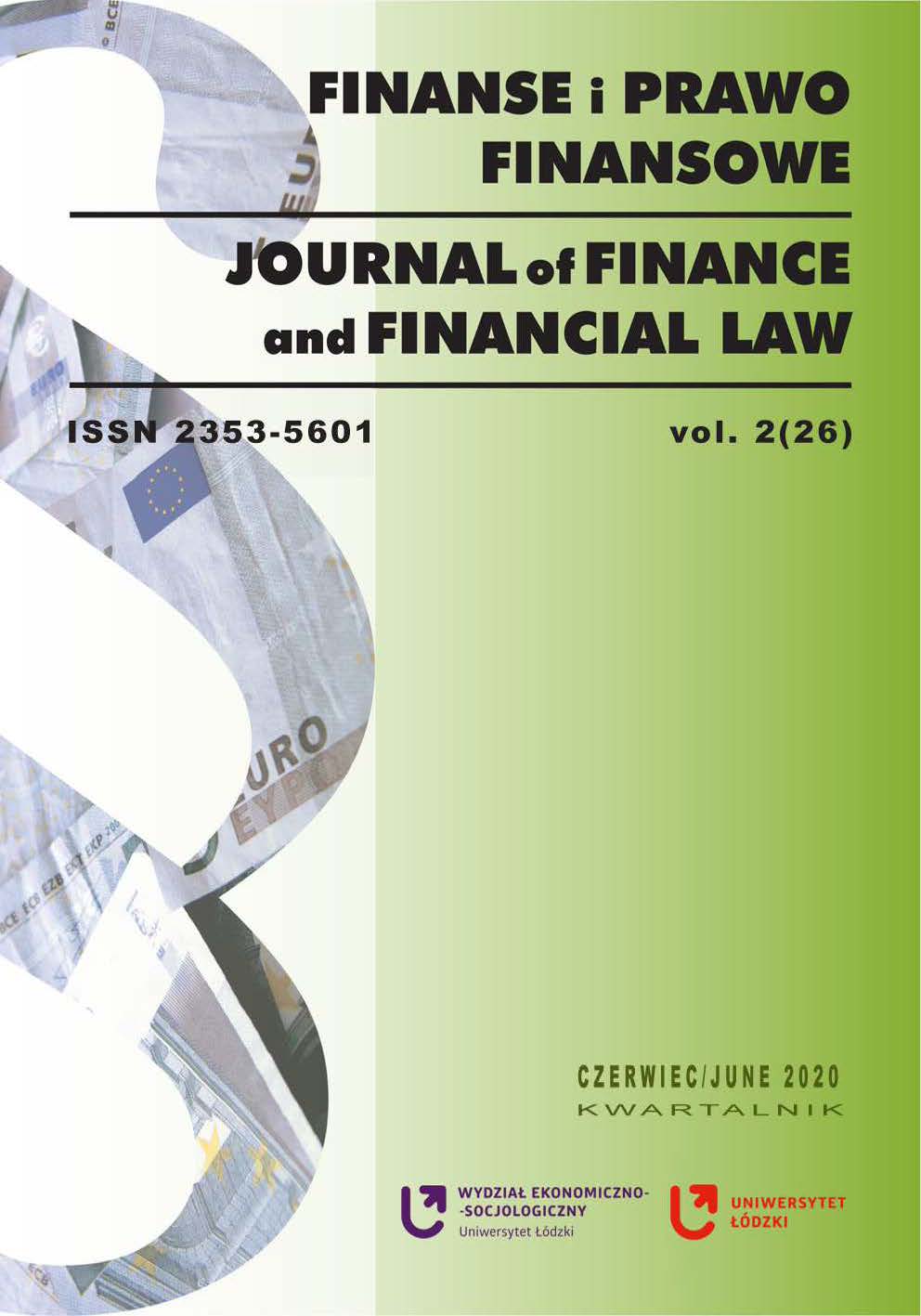The Growing Importance of the Financial Sector in the Founding Countries of the European Union
DOI:
https://doi.org/10.18778/2391-6478.2.26.03Słowa kluczowe:
financialization, financial sector, European UnionAbstrakt
The economies of the 21st century countries operate on the principle of connected vessels. A significant element of changes in economies is the growth of the financial sector. The process of financial sector growth is often referred as financialization. The significant impact of this sector on economic development was shown during the financial crisis of 2008. Financialization is more visible in highly developed countries. Undoubtedly the founding countries of the European Union belong to highly developed countries. It is possible that the financialization is higher in bigger countries like France, Germany, Italy or United Kingdom, which can also have bigger financial sectors. From the other side there is also country, which economy is based on banks. The aim of the article is to indicate the growth of the financial sector in the founding countries of the European Union. To determine the growth of the financial sector, the author used the indicators appearing in the literature of subject. There are indicators relating to functioning of the economy and banking sector. The second method helps to determine in which country financialization is higher. To made the research there was used zero unitarization method. The results of the study allows to determine in which of the subjects the financial sector is at a higher level of development. It is possible, that during researched period there were changes in financializiation of researched countries.
Pobrania
Bibliografia
Alves C., Toporowski J., 2019, Growth of international finance and emerging economies: Elements for an alternative approach, „PSL Quarterly Review”, vol. 72, no. 288.
Google Scholar
Balcerzak, A. P., 2015, Europe 2020 strategy and structural diversity between old and new member states. Application of zero unitarization method for dynamic analysis in the years 2004–2013, „Economics & Sociology”, vol. 8(2).
Google Scholar
Batt R., 2012, The Impact of Financialization on Management and Employment Outcomes, Cornell University, New York.
Google Scholar
Bowman A., 2018, Financialization and the extractive industries: The case of South African platinum mining, „Competition and Change”, vol. 22, no. 4.
Google Scholar
Bruno V.G.. Büyükşahin B., Robe M.A., 2013, The Financialization of Food?, „Bank of Canada, Working Paper/Document de travail 2013-39”, Ottawa.
Google Scholar
Bryan D., Martin R., Rafferty M., 2009, Financialization and Marx: Giving Labor and Capital a Financial Makeover, „Review of Radical Political Economics”, vol. 41, no. 4.
Google Scholar
Crotty J., 2003, The Neoliberal Paradox: The Impact of Destructive Product Market Competition and Impatient Finance on Nonfinancial Corporation Performance in the Neoliberal Era, „Review of Radical Political Economics”, vol. 35, no. 3.
Google Scholar
Engelen E., Fernandez R., Hendrikse R., 2014, How Finance Penetrates its Other: A Cautionary Tale on the Financialization of Dutch University, „Antipode”, vol. 46, no. 4.
Google Scholar
Eurostat Database, https://ec.europa.eu/eurostat/data/database [dostęp 7.05.2018].
Google Scholar
Florczak T., 2019, The process of financialization in groups of European Union member states, [in:] 46th International Scientific Conference on Economic and Social Development – „Sustainable Tourist Destinations”, Book of Proceedings, Varazdin.
Google Scholar
Glyn A., 2006, Capitalism Unleashed: Finance, Globalization, and Welfare, Oxford University Press, Oxford.
Google Scholar
Gołębiowski G., Szczepankowski P., 2015, Finansyzacja gospodarki krajów Europy Środkowo-Wschodniej, „Ruch Prawniczy, Ekonomiczny i Socjologiczny”, LXXVII – issue 4.
Google Scholar
Hardie I., 2011, How much can governments borrow? Financialization and emerging markets government borrowing capacity, „Review of Iternational Political Economy”, vol. 18.
Google Scholar
Jäger J., Springer E., 2015, Debating the future of Europe. Critical political economy and post- -Keynesian perspectives, [in:] Asymmetric crisis in Europe and possible futures. Critical political economy and post-Keynesian perspectives, Routledge Tayleor & Francis Group, London.
Google Scholar
Hein E., 2009, A (Post-)Keynesian perspective on 'financialization', „IMK Studies”, vol. 1.
Google Scholar
Kalogerakos T., 2013, Financialization, the Great Recession, and the rate of profit: Profitability trends in the US corporate business sector, 1946–2011, „Lund University – School of Economics and Management”, Lund.
Google Scholar
Kukuła K., 2000, Metoda unitaryzacji zerowanej (Zero unitarization method), PWN Scientific Publishing House, Warsaw.
Google Scholar
Moosa I.A., 2018, Does financialization retard growth? Time series and cross-sectional evidence, „Applied Economics”, vol. 50, no. 31.
Google Scholar
Palley, T., 2007, Financialization: What It Is and Why It Matters, „Annandaleon-Hudson, NY: The Levy Economics Institute Working Paper”, no. 525.
Google Scholar
Thompson P., 2013, Financialization and the workplace: Extending and applying the disconnected capitalism thesis, „Work, Employment and Society”, vol. 27, no. 3.
Google Scholar
Turbeville W., 2014, Financialization and a New Paradigm for Financial Markets, Demos/New Economic Paradigms/Rockefeller Foundation.
Google Scholar
Wiśniewski P., 2014, Nowe miary finansjalizacji, [in:] Rozwój nauki o finansach. Stan obecny i pożądane kierunki jej ewolucji, SGH Warsaw School of Economics, Warsaw.
Google Scholar
World Bank Financial Development and Structure Dataset 2019, https://www.worldbank.org/en/ publication/gfdr/data/financial-structure-database [dostęp 10.03.2020].
Google Scholar
Van Treeck T., 2007, A Synthetic, Stock-Flow Consistent Macroeconomic Model of Financialisation, „Macroeconomic Policy Institute (IMK) in the Hans Boeckler Foudation Working Paper”, no. 6.
Google Scholar
Vasudevan R., 2009, Dollar Hegemony, Financialization, and the Credit Crisis, „Review of Radical Political Economics”, vol. 41, no. 3.
Google Scholar
Vercelli A., 2017, Crisis and sustainability. The Delusion of Free Markets, Macmillan Publishers Ltd., London.
Google Scholar
Zygmunt A., 2017, Innovation activities of Polish firms. Multivariate analysis of the moderate innovator countries., „Oeconomia Copernicana”, vol. 8(4).
Google Scholar
Pobrania
Opublikowane
Jak cytować
Numer
Dział
Licencja

Utwór dostępny jest na licencji Creative Commons Uznanie autorstwa – Użycie niekomercyjne – Bez utworów zależnych 4.0 Międzynarodowe.














